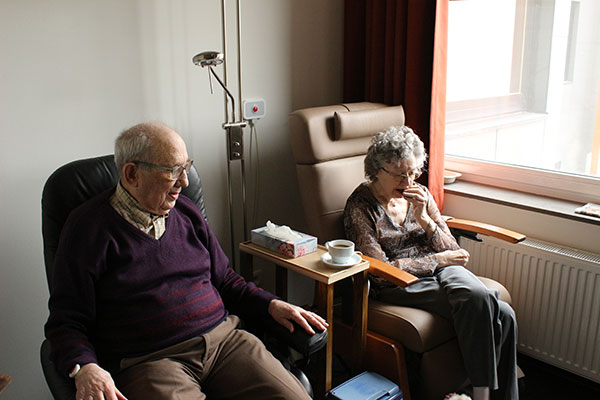Get the insurance plan
that is right for you.
You might consider life insurance, which allows you to create an instant estate plan. You might be interested in a plan that covers your mortgage, takes care of your family, or gives you other coverage should you suffer a critical illness or disability. You might be looking for the best possible plan for your retirement. A financial advisor can plan with you and give you the tools to ensure you have a secure future.
What is Life Insurance?
Life insurance is a contract with an insurer that promises a set amount of money will be given to your beneficiary and/or estate upon your death. Your benefit amount depends upon many factors including the policy you choose, your age, gender and health, and the amount of premium you pay. Your advisor will discuss these details with you to make sure that you get the policy that is right for you, whether with fixed coverage and specific terms, or with greater flexibility. If your financial situation changes, you can adjust your policy accordingly with the help of your advisor.
What benefit do I get from having life insurance?
Life insurance can give you the peace of mind to know that, if something should happen to you, your loved ones won’t be left with a legacy of debt, final taxes or other financial worries. Over time, events in your life might cause you to re-evaluate your financial goals and consider the protection life insurance can provide. Perhaps you’re getting married, buying a home, having children or planning for your retirement. With an appropriate plan, life insurance can help you meet your goals in life and protect your family when you no longer can.
Certain business situations call for life insurance. If you’re an entrepreneur or just starting a business you’ll need to protect your enterprise and your partners. A uniquely tailored insurance solution can also provide the money necessary to enable your fellow shareholders or partners to buy you out when you’re ready to retire.
How does critical illness insurance work?
Critical Illness insurance provides you with a lump-sum payment to be used however you see fit. You can try alternative therapies, be treated outside of the country, hire someone to take care of you, hire a nanny to take care of your children and you choose how to spend your money.
You are eligible for your cash payment usually just 30 days after diagnosis and with no requirement on how you spend the money. You don’t have to get approval for expenditures, you don’t have to provide any receipts, and you don’t even have to spend the money on medical expenses.
If you die while the policy is in force, your beneficiary receives a refund of 100% of the premiums that you paid into your Critical Illness policy.
What chance is there that I will never need critical illness insurance?
Did you know that you have a greater chance of getting a critical illness than dying before you’re 75?
That probably seems scary.
The good news is that the majority of people who are diagnosed with a critical illness before 75 years old recover and get on with their life. In fact, statistics show that:
- More than 90% of people who have their first heart attack recover.
- More than 75% of people who have a stroke survive the initial incident.
- Women have a 1 in 9.5 chance of developing breast cancer and only a 1 in 26 chance of dying from it.
- Men have a 1 in 9 chance of developing prostate cancer and only a 1 in 27.5 chance of dying from it.
If you are diagnosed with a critical illness you want to focus on your recovery. Treating an illness often includes unexpected costs, from medicine the government doesn’t cover to taking a break from your treatment. All of these extras cost money, money that a Critical Illness Insurance policy can provide.
What illnesses does critical illness insurance cover?
Critical Illness insurance covers specific illnesses only, and provides a way of protecting yourself against the high cost of rebuilding your lifestyle following a critical illness. You are eligible for your cash payment usually just 30 days after diagnosis and with no requirement on how you spend the money.
Most policies cover the following illnesses:
- Heart Attack
- Loss of Limbs
- Major Organ Transplant
- Stroke
- Blindness
- Coma
- Multiple Sclerosis
- Deafness
- Severe Burns
- Parkinson’s Disease
- Cancer
- Paralysis
- Loss of Speech
- Kidney Failure
- Heart Bypass Surgery
- Motor Neuron Disease (ALS)
- Alzheimer’s Disease
- Occupational HIV
You can also customize your Critical Illness Insurance policy. We can help you determine which options are best for you.
Disability Insurance
What is disability insurance?
Disability insurance replaces a portion of your income. Policies differ on how soon you collect benefits and for how long. They also vary in whether disability benefits are received if you can’t perform the duties of your own occupation, a job in your field, or any job at all.
A disability can affect your personal income and the security of your business operations. A life insurance benefit is usually payable in a lump sum, and this payment ends the contract. Disability insurance benefits are almost always payable on a monthly basis, while disability continues. Upon recovery from a disability, the policy continues. Benefits could potentially be payable again for subsequent disabilities or for the recurrence of a prior disability.
What benefit do I get from having disability insurance?
Most people are unaware of the startling disability statistics. Often they have purchased life insurance to protect their families in the event of death.
In fact, the odds are far greater that a person will become disabled in a given year than that he or she will die. Up to the age of 37, the chance of suffering a disability of at least 90 days is eight times as great as the chance of death. While death may be inevitable, disability is more probable at any given age.

How does health insurance work?
Health insurance usually provides either direct payment or reimbursement for expenses associated with illnesses and injuries. The cost and range of protection provided by your health insurance will depend on your insurance provider and the particular policy you purchase. If your employer does not offer a health insurance plan, you may wish to purchase health insurance on your own.
What benefit do I get from having health insurance?
Let’s face it – health insurance is a necessity in today’s world. The costs of medical care and treatment have soared to new heights in recent years and are expected to rise even further in the years to come. Think for a moment about the enormous medical costs you would incur if you suffered a major injury tomorrow or were suddenly stricken with a life-threatening illness.
Uninsured people live with such risk every day of their lives; health insurance can shield you from that risk. Even if you’re healthy today and have never had any major problems in the past, you simply can’t predict the future. In addition to medical emergencies, routine conditions requiring visits to a physician or dentist happen all the time (e.g., pregnancy, viruses that seem to hang on forever, moles that don’t look quite right, preventative dental care and surgery). This is especially true if you have children. Ear infections, rashes, and high fevers are commonplace with infants and children. While numerous trips to the doctor are covered by Provincial Insurance the resulting medications or treatments can be pretty expensive without health insurance.
What is mortgage life insurance?
Mortgage life insurance, also known as mortgage insurance or creditor insurance, is offered by most banks and lending institutions. It is a life insurance policy that pays the balance of your mortgage to the lending institution if a person listed on the mortgage passes away.
How does term life insurance cover your mortgage?
When you purchase a term life insurance policy, you take into account all the money your family will need in case you are not around to help out. This includes your mortgage payments.

What is long term care insurance?
Health insurance usually provides either direct payment or reimbursement for expenses associated with illnesses and injuries. The cost and range of protection provided by your health insurance will depend on your insurance provider and the particular policy you purchase. If your employer does not offer a health insurance plan, you may wish to purchase health insurance on your own.
What benefit do I get from having health insurance?
Let’s face it – health insurance is a necessity in today’s world. The costs of medical care and treatment have soared to new heights in recent years and are expected to rise even further in the years to come. Think for a moment about the enormous medical costs you would incur if you suffered a major injury tomorrow or were suddenly stricken with a life-threatening illness.
Uninsured people live with such risk every day of their lives; health insurance can shield you from that risk. Even if you’re healthy today and have never had any major problems in the past, you simply can’t predict the future. In addition to medical emergencies, routine conditions requiring visits to a physician or dentist happen all the time (e.g., pregnancy, viruses that seem to hang on forever, moles that don’t look quite right, preventative dental care and surgery). This is especially true if you have children. Ear infections, rashes, and high fevers are commonplace with infants and children. While numerous trips to the doctor are covered by Provincial Insurance the resulting medications or treatments can be pretty expensive without health insurance.

We help you address these business concerns.
To ensure your business is successful, some of the concerns you need to address are listed below:
- disability or loss of an owner
- disability or loss of a key person
- attracting employees/executives
- retaining employees/executives
- using the business to support retirement income
- business investment income taxes
- covering capital gains tax liabilities
- We help address these concerns.





